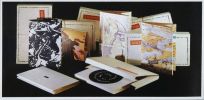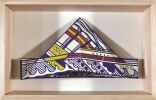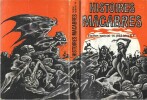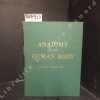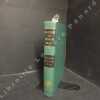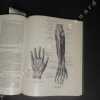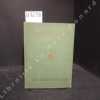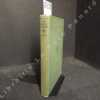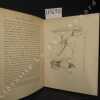24 books for « hamilton william »Edit
-
Latest
Last month (1)
Last week (2)
-
Century
18th (2)
19th (5)
20th (10)
-
Countries
Denmark (4)
France (17)
Italy (1)
Switzerland (2)
-
Syndicate
ILAB (13)
NVVA (1)
SLACES (1)
SLAM (6)
Topics
- Adam (1)
- Anatomy (1)
- Brain (1)
- Congo (1)
- Europe (3)
- Fantastic (1)
- Ferry jules (1)
- First edition (1)
- Flora (2)
- Flowers (1)
- Gaskell (1)
- Geology (3)
- Great britain (2)
- Greece (1)
- History (4)
- History of art (1)
- Honey (1)
- Human body (1)
- Ireland (3)
- Italian (1)
- Italy (1)
- Liechtenstein (1)
- Literature (1)
- Lorenzo (1)
- Man ray (1)
- Mathematics (1)
- Monk (1)
- O'hara (1)
- Physics (2)
- Poe edgar (1)
- Sicily (1)
- Sun (1)
- Surrealism (1)
- Tea (3)
- Trade (1)
- Wildlife (1)
Voyage à la côte septentrionale du comté d'Antrim en Irlande, et à l'île de Raghery. contenant l'histoire naturelle de ses productions volcaniques, & plusieurs observations sur les antiquités & moeurs de ce pays (…). Traduit de l'Anglois. Auquel on a ajouté l'Essai sur l'oryctographie du Derbyshire. Par M. Ferber. Traduit de l'Allemand
Paris, Cuchet, 1790 in-8, VIII-240 pp., avec une pl. dépl., demi-basane blonde, dos lisse orné de filets dorés, tranches jaunes (reliure de l'époque). Coins émoussés, mais bon exemplaire.
Unique édition française de cette relation qui se concentre surtout sur la géographie et l'histoire naturelle de l'Irlande.Relié à la suite : TWISS (Richard) : Voyage en Irlande ; contenant des observations sur la situation, l'étendue de ce pays ; le climat, le sol, les productions des trois règnes de la nature ; les rivières, les baies, les ports, les antiquités, le gouvernement, les troubles, les révolutions, le caractère, les moeurs, les coutumes, le commerce, les manufactures, les sciences, la distance des principales villes, etc., etc. Traduit de l'anglais, par C. Millon. Avec gravure et carte générale de l'Irlande. Paris, Prudhomme, an VII [1799], [4]-180 pp., avec une pl. dépl. et une grande carte gravée par Edme Mentelle, aux contours rehaussés de couleurs, également dépl. Unique traduction française de "A tour in Ireland in 1775", dont la publication, en 1776, avait suscité un tollé dans l'île, tant la description que donnait l'écrivain Richard Twiss (1747-1821) des habitants du pays et de leurs moeurs était peu flatteuse.Précieux exemplaire du célèbre naturaliste Bernard-Germain-Etienne de La Ville sur Illon de Lacépède (1756-1825), premier Grand Chancelier de la Légion d'Honneur, avec ex-libris manuscrit apposé aux faux-titres des deux ouvrages (nom développé sur le premier, simple sur le second). - - VENTE PAR CORRESPONDANCE UNIQUEMENT


Phone number : 06 46 54 64 48
HAMILTON, WILLIAM ROWAN. - THE GENERAL PRINCIPLE OF LEAST ACTION - HAMILTON' S PRINCIPLE.
Reference : 42329
(1834)
On a general Method in Dynamics" by which the Study of the Motions of all free Systems of attracting or repelling Points is reduced to the Search and Differentiation of one central Relation, or characteristic Function. Received April 1, - Read April 1...
London, Richard Taylor, 1834-35. 4to. No wrappers as extracted from ""Philosophical Transactions"" 1834 - Part II. and 1835 - Part I. Both titlepages to the volumes present.Pp. (2),247-308 a. (2),95-144. Both papers clean and fine.
First appearance of these two groundbreaking papers in which Hamilton carries further the dynamics of Lagrange by expressing the kinetic energy in terms of the momenta and the co-ordinates of a system, and discovers how to transform the Lagrangian equations into a set of differential equations of the first order for the determination of of the motion. The Hamilton principle is also called The Principle of ""Least Action"". The Hamilton Principle as stated in the papers offered here ""was the first of his two great ""discoveries"". he second was the quaternions, which he discovered...1843 nd towhich he devoted most of his efforts during the remaining 22 years of his life.""(DSB).Maupertouis, Euler, and Lagrange introduced the principle of ""Least Action"" covering the science of dynamics, and now Hamilton brought the principle into a form which was capable of expressing all the laws of Newtonian science in a representation as minimum-problems, that is, all gravitational, dynamical and electrical laws could be represented as minimum problems. In 1925 Heisenberg, Born and Jordan showed, that the Hamilton equations are still valid in quantum theoryAlthough formulated originally for classical mechanics, Hamilton's principle also applies to classical fields such as the electromagnetic and gravitational fields, and has even been extended to quantum mechanics, quantum field theory, relativity and criticality theories. Its influence is so profound and far reaching that many scientists regard it as the most powerful single principle in mathematocal physics and place it at the pinnacle of physical science.
On Quaternions" or on a new System of Imaginaries in Algebra. - [MAKING THE GENERAL THEORY OF RELATIVITY POSSIBLE]
London, Richard and John Taylor, 1844. Contemp. hcalf. Gilt lettering to spine ""Philosophical Magazine"" - Vol. XXV. In: ""The London, Edinburgh, and Dublin Philosophical Magazine and Journal of Science. Conducted by David Brewster et al."". Vol. XXV. A stamp to titlepage and a few other pages. Entire volume offered (July-December 1844). VIII,552 pp., textillustr. Hamilton's paper: pp. 10-13, 141-145 and 241-246.
First printing of this landmark paper in which Hamilton published his creation of a new algebra of quaternions (a noncommunicative algebra), a turning point in the development of mathematics and a discovery which made possible the creation of the general theory of relativity. His algebra was later to form the basis of quantum mechanics and for the proper understanding of the atom.""Gauss had treated imaginary numbers in combination with real ones as representing points on a plane and showed the methods by which such complex numbers could be manipulated. Hamilton tried to extend this to threee dimensions and found himself unable to work out a self-consistent method of multiplication, until it occurred to him that the cummutative law of multiplication need not necessarily hold. It is taken for granted that A times B is equal to B times A... and this is an example of what seems to be an eternal and inescapable truth. Hamilton, however, showed that he could built up a logical algebra for his quaternions only when B times A was not made to equal - A times B. This seems against common sense but, like Lobachevski, Hamilton showed that the truth is relative and depends on the axioms you choose to accept.""(Asimov).The creation of quaternions is one of the famous moments in the history of mathematics. ""The quaternions came to Hamilton in one of those flashes of understanding that occasionally occur after long deliberation on a problem. He was walking into Dublin on 16 October 1843 along the Royal Canal to preside at a meeting of the Royal Irish Academy, when the discovery came to him. As he described it, ""An electric circuit seemed to close.""18 He immediately scratched the formula for quaternion multiplication on the stone of a bridge over the canal. His reaction must have been in part a desire to commemorate a discovery of capital importance, but it was also a reflection of his working habits. Hamilton was an inveterate scribbler. His manuscripts are full of jottings made on walks and in carriages. He carried books, pencils, and paper everywhere he went. According to his son he would scribble on his fingernails and even on his hard-boiled egg at breakfast if there was no paper handy.""(DSB).Hamilton later developed his invention in his book from 1853 ""Lectures on Quaternions"" - see PMM: 334 and Grattan-Guiness ""Landmark Writings in Western Mathematics 1640-1940"", pp. 460 ff.In this volume other importent papers by Gassiot, Sylvester, Joule, Draper.
Second Essay on a general Method in Dynamics. Received October 29, 1834, - Read January 15, 1835. (2 Memoirs).
London, Richard Taylor, 1834-35. 4to. No wrappers as extracted from ""Philosophical Transactions"", 1835 - Part I. Titlepages to the volume present. (2),95-144. Both papers clean and fine.
First appearance of this groundbreaking paper in which Hamilton develops the whole of theoretical dynamics by the aid of one function only, his 'Characteristic' or 'Principal' Function. He applies his method to a case of planetary motion, using a system of canonical elements"" (Introduction, The Mathematical Paper of Sir William Rowan Hamilton, xiii). Hamilton then argues that the ""tool of the characteristic function could also be applied to reformulate the fundamental laws of dynamics"" thus the actual motion of mass point in a field of forces, e.g., is found to be governed by equations that are the analogues of those determining the propagation of the rays of light. Hamilton's optical-mechanical analogy, not only provided a new and more powerful formulation of classical mechanics but also, came to form the foundation of the Schrödinger scheme of quantum mechanics, e.g., wave mechanics. "" (Mehra The Historical Development of Quantum Theory)
FRAGMENTS DE PHILOSOPHIE
Librairie de Ladrange, Paris. 1840. In-8. Broché. Etat d'usage, 2ème plat abîmé, Dos abîmé, Rousseurs. 390 pages. Etiquette de code sur la couverture.. . . . Classification Dewey : 820-Littératures anglaise et anglo-saxonne
Par William Hamilton, Prof. de Logique et de Métaphysique à l'Univ. D'Edimbourg. Trad. de l'anglais par Louis Peisse, avec une Préface, des Notes et un Appendice du traducteur. Classification Dewey : 820-Littératures anglaise et anglo-saxonne
Observations sur les Volcans des deux Siciles. Telles qu'elles ont été communiquées à la Societé Royale de Londres. / Campi Phlegraei. Observations on the volcanos of the two Siciles As they have been communicated to the Royal Society of London. Naples MDCCLXXVI (1776). Reprint.
s.d., vers 1990, imp. in-folio, reliure en d.-cuir originale. Ex. en parfait état.
Facsimile de l’ouvrage de 1776 , un fort et grand volume in-folio relié. Exemplaire en très bon état, bilingue Anglais et Français, nombreuses gravures en couleurs. Image disp.

(SLACES, NVVA)
Phone number : 41 (0)26 3223808
MAMMALS OF THE EASTERN UNITED STATES
Comstock Publishing 1979. In Comstock Publishing 1979. In-8 relié toile sous jaquette de 346 pages illustrées. Très bon état
Toutes les expéditions sont faites en suivi au-dessus de 25 euros. Expédition quotidienne pour les envois simples, suivis, recommandés ou Colissimo.
OBSERVATIONS SUR LES VOLCANS DES DEUX SICILES Telles qu'elles ont été communiquées à la sociétè royale de Londres
réedition de l'ouvrage de 1776 , en un fort et grand volume relié en trés bon état , volume bilingue Anglais et Français , trés nombreuses gravures en couleurs
Phone number : 02 31 23 48 44
A Rhetoric of Bourgeois Revolution The Abbé Sieyes and What is the Third Estate?.
Duke University Press, 1994 21,59 x 13,97 x 1,57 cm., 221 pp, Broché
- - VENTE PAR CORRESPONDANCE UNIQUEMENT
Irving Petlin, Su Braden, James Lee Byars, Christo, Walter de Maria, Richard Hamilton, Kaspar Koenig, Julien Levy, Sol Mednick, Nancy Reitkopf, La Monte Young, Marian Zazeela, Nicolas Calas, Bruce Conner, Marcia Herscovitz, Alain Jacquet, Ray Johnson, Lee Lozano, Bernard Pfriem, George Reavey, Clovis Trouille, John Battan, William Bryant, Dick Higgins, Joseph Kosuth, Ronnie Landfield, Roland Penrose, Man Ray, Hannah Weiner, Terry Riley, Robert Stanley, Paul Bergtold, John Cage, Hollis Frampton, Roy Lichtenstein, Lil Picard, Domenico Rotella, Robert Watts, William Anthony, William Copley, Edward Fitzgerald, Neil Jeanney, Angus MacLise, Bruce Nauman, Yoko Ono, Mel Ramos, Robert Rohm, William Schwadler, Diane Wakoski, Lawrence Weiner, Richard Artschwager, Ed Bereal, Diter Rot, Betty Dodson, Ronoldo Ferry, John Giorno, Adrian Nutbeam, Claes Oldenburg, Micha Petrov, Jean Reavey, Bernar Venet, Paul Steiner, Marcel Duchamp, Tom Westermann , Bob Watts , Toby Mussman , On Kawara , Arman , Congo , Aftograf , Princess Winifred, Enrico Baj, Lawrence Weiner
Reference : 100144
(1968)
SMS (Shit Must Stop). N°1 à 6 ; collection complète.
New York The Letter Edged in Black Press, 1968. 1968 6 17.8 x 27.9 cm. New York, The Letter Edged in Black Press, 1968. Six portefeuilles 178 x 279 mm, présentés dans leurs emballages postaux d’origine, contenant chacun un sommaire, pour un total de 73 multiples originaux.
Artistes ayant collaboré: Irving Petlin, Su Braden, James Lee Byars, Christo, Walter de Maria, Richard Hamilton, Kaspar Koenig, Julien Levy, Sol Mednick, Nancy Reitkopf, La Monte Young, Marian Zazeela, Nicolas Calas, Bruce Conner, Marcia Herscovitz, Alain Jacquet, Ray Johnson, Lee Lozano, Bernard Pfriem, George Reavey, Clovis Trouille, John Battan, William Bryant, Dick Higgins, Joseph Kosuth, Ronnie Landfield, Roland Penrose, Man Ray, Hannah Weiner, Terry Riley, Robert Stanley, Paul Bergtold, John Cage, Hollis Frampton, Roy Lichtenstein, Lil Picard, Domenico Rotella, Robert Watts, William Anthony, William Copley, Edward Fitzgerald, Neil Jeanney, Angus MacLise, Bruce Nauman, Yoko Ono, Mel Ramos, Robert Rohm, William Schwadler, Diane Wakoski, Lawrence Weiner, Richard Artschwager, Ed Bereal, Diter Rot, Betty Dodson, Ronoldo Ferry, John Giorno, Adrian Nutbeam, Claes Oldenburg, Micha Petrov, Jean Reavey, Bernar Venet, Paul Steiner, Marcel Duchamp, Tom Westermann , Bob Watts , Toby Mussman , On Kawara , Arman , Congo , Aftograf , Princess Winifred, Enrico Baj.Broken Music page 230 ; Urawa Art Museum 2000 ; Documenta 6 catalogue 3 p.335 ; Söhm 319 ; Moeglin-Delcroix Esthétique du livre d'artiste, 1997, p.116. Papier-gesänge 107 ; Pop Art Store p.77; ; Marie Boivent : Revue d'Artistes Une sélection p.62 à 66;, p.335; Expositions : New York 1988, 1992 ; Paris, Berlin, Tokyo 1989., catalogue p.181-182. Parfait état dans les boîtes originales d’expédition. Pdf détaillé sur demande.(100144)
Phone number : +33 1 48 01 02 37
RECUEIL FACTICE] HAMILTON, Sir William; BOURNON, Jacques-Louis de
Reference : 74187
(1790)
Voyage à la côte septentrionale du comté d'Antrim en Irlande et à l'île de Raghery... Par M. Hamilton. [Relié avec] Essai sur la lithologie des environs de Saint-Etienne-en-Forez... Par M. de Bournon
À Paris, chez Cruchet [et] s.n, s.l, 1790 [et] 1785, in-8, 2 ouvrages en 1 volume, VIII-239-[1] pp, 1 carte depl. ; [4]-XVIII-104 pp, Demi-basane fauve mouchetée, dos à nerfs et fileté, pièce de titre rouge, Réunion de deux ouvrages peu courants. Première édition française de la relation du clerc et magistrat irlandais William Hamilton (1755-1797) : Voyage à la cote septentrionale du comté d'Antrim en Irlande, et à l'île de Raghery. Contenant l'histoire naturelle de ses productions volcaniques, & plusieurs observations sur les antiquités et moeurs de ce pays... Cette monographie précoce sur la géologie de l'Irlande et de l'Île de Rathlin comprend l'ouvrage du géologue allemand Jacob Ferber sur le Derbyshire en Angleterre. Elle est ornée d'une planche gravée représentant 4 coupes géologiques. Le Voyage d'Hamilton (qui ne doit pas être confondu avec son homologue, homonyme et contemporain, le volcanologue britannique William Hamilton, 1730-1803) a paru pour la première fois en anglais en 1786 (Letters Concerning the Northern Coast of the County of Antim...). Quérad IV, 20. Édition originale du rare Essai sur la lithologie des environs de Saint-Etienne-en-Forez, par le directeur du cabinet minéralogique du roi, le comte de Bournon (1751-1825). Cet ouvrage très remarquable pour l'époque concerne également l'origine des charbons de pierre de la région et contient des observations sur les silex, pétro-silex, jaspes et granits. Exemplaire imprimé sur papier azuré. Quérard I, 474. Bon exemplaire. Petits trous de ver en pied du dos. Couverture rigide
Bon 2 ouvrages en 1 volume,
COLLECTION OF ENGRAVINGS FROM ANCIENT VASES, MOSTLY OF PURE GREEK WORKMANSHIP DISCOVERED IN SEPULCHRES IN THE KINGDOM OF THE TWO SICILIES.
With remarks on each vase. Tischbein, Naples, 1791-1795. In folio (mm. 495x375, 3 volumi, cartonato coevo (allentato). Prima edizione, con le belle tavole e il testo inc. in rame. Lopera è così composta: vol. I: 2 frontespizi (inglese e francese), antiporta figurata, pp. 159,(3), testo inglese e francese, 2 tavv. (num. 2 e 3: la tav. 1 corrisponde allantiporta), seguono 48 (su 60) tavv. numerate. Mancano le tavv.: 1, 2, 14, 15, 18, 21, 34, 46, 47, 48, 49 e 53<br>vol. II: 2 frontespizi (inglese e francese), 4 tavv., pp. 104, testo inglese e francese, seguono 62 (su 63) tavv. num. Manca la tavola non num. in fine<br>vol. III: 2 frontespizi (inglese e francese), 7 inc. (numerate con lettere A-G) in 5 tavv., pp. (6),97, seguono 49 (su 60) tavv. Mancano le tavv.: 2, 10, 25, 32, 33, 34, 35, 40. 41, 57 e 58. With remarks on each vase discovered in the Kingdom of the Two Sicilies but chiefly in the neighbourhood of Naples during the course of the years 1789 an 1790, now in the possession of Sir W.m Hamilton, His Britannic Maiestatys envoy extr.y and plenipotentiary at the Court. Importante collezione di incisioni relative a vasi antichi di fattura greca: rinvenuti nei sepolcri del Regno delle Due Sicilie ma soprattutto nei dintorni di Napoli nel corso degli anni MDCCLXXXIX (1789) e MDCCLXXXX (1790) ora in possesso di Sir W. Hamilton, inviato di Sua Maestà Britannica Provinciale e plenipotenziario presso il tribunale di Napoli. Dopo aver venduto la sua prima collezione di vasi al British Museum di Londra, Sir William Hamilton (1730-1803) iniziò a costruire una nuova collezione e la pubblicò nel 1791-95 in quattro volumi illustrati da Wilhelm Tischbein. Le illustrazioni mostrano solo i vasi in forma semplice e non sempre vengono fornite informazioni sulla forma e sulle dimensioni.Cfr. Blackmer,778: First edition of the illustrations of Hamiltons second collection of vases. He produced the text in cooperation with the Russian ambassador to Naples, Prince Italinski, and the plates were the work of Tischbein, who was director of the Academy of Art in Naples. Discreto esemplare.
( Fantastique ) - Michel Deutsch - Philippe Druillet - Hugh Atkinson - Jane Gaskell - J. A. Cuddon - Anthony Burgess - Montague Haltrecht - Richard Nettell - Derwent May - John Brunner - Peter Brent - Patrick Boyle - John Burke - William Trevor - Michael Baldwin - Alex Hamilton.
Reference : 32317
(1959)
Fiction Spécial 14 ( 182 bis ) : Histoires Macabres. ( Splinters. A New Anthology of Macabre Modern Fiction ).
Editions Opta / Revue Fiction Spécial 14 ( 182 bis ) de 1969. In-12 broché de 239 pages au format 19 x 13,5 cm. Magnifiques couvertures illustrées par Philippe Druillet. Dos carré. Plats et intérieur frais, malgré de d'infimes frottis aux coins. Traduction par Michel Deutsch des nouvelles fantastiques parues aux états-unis chez Hutchinson, en 1968, de l'anthologie : Splinters. A New Anthology of Macabre Modern Fiction avec des nouvelles de : Hugh Atkinson, Jane Gaskell, J. A. Cuddon, Anthony Burgess, Montague Haltrecht, Richard Nettell, Derwent May, John Brunner, Peter Brent, Patrick Boyle, John Burke, William Trevor, Michael Baldwin, Alex Hamilton. Superbe état général. Rare édition originale.
Vente exclusivement par correspondance. Le libraire ne reçoit, exceptionnellement que sur rendez-vous. Il est préférable de téléphoner avant tout déplacement.Forfait de port pour un livre 8,50 €, sauf si épaisseur supérieure à 3 cm ou valeur supérieure ou égale à 100 €, dans ce cas expédition obligatoire au tarif Colissimo en vigueur. A partir de 2 livres envoi en colissimo obligatoire. Port à la charge de l'acheteur pour le reste du monde.Les Chèques ne sont plus acceptés.Pour destinations extra-planétaire s'adresser à la NASA.Membre du Syndicat Lusitanien Amateurs Morues
VOYAGE A LA COTE SEPTENTRIONALE DU COMTE D'ANTRIM EN IRLANDE ET A L'ILE DE RAGHERY. Contenant l'histoire naturelle de ses productions volcaniques, & plusieurs observations sur les antiquités & moeurs de ce pays.. auquel on a ajouté l'essai..
Paris Chez Cuchet 1790 in 8 (20,5x13) 1 volume reliure demi veau fauve de l'époque, dos lisse orné, filets et fleurons dorés, pièce de titre de cuir marron, VIII et 239 pages, petite usure sur les coiffes. Auquel on a ajouté l'essai sur l'oryctographie du Derbyshire par M. Ferber, traduit de l'Allemand. Johann Jacob Ferber, 1743-1790, géologue allemand. William Hamilton, 1755-1797. Le plan dépliant de géologie manque. Bon exemplaire ( Photographies sur demande / We can send pictures of this book on simple request )
Très bon Couverture rigide
Helen Adam, Laurie Anderson, Robert Ashley, Jim Brodey, Otis Brown, William S. Burroughs, Jackie Curtis, Mona DaVinci, Kenward Elmslie, The Fugs, John Giorno, Philip Glass, Anthony J. Gnazzo, Ted Greenwald, Steve Hamilton, Bernard Heidsieck, Joe Johnson, Michael Lally, Denise Levertov, Robert Lowell, Meredith Monk, Eileen, Myles, Frank O'Hara, Claes Oldenburg, Joel Oppenheimer, Ron Padget, Ishmael Reed, Ed Sanders, Harris Schift, Patti Smith, Lorenzo Thomas, Steve & Gloria Tropp, Anne Waldman, Larry Wendt, Robert Wolson & Christopher Knowles
Reference : 103164
(1978)
BIG EGO
1978 disque Etats Uis, 1978, Giorno Poetry System GPS 012-013, 2 disques 33trs, 30cm, sous pochette ouvrante, conception et photographies de Les Levine.The Dial-a-Poem poets Big Ego.Avec, Helen Adam, Laurie Anderson, Robert Ashley, Jim Brodey, Otis Brown, William S. Burroughs, Jackie Curtis, Mona DaVinci, Kenward Elmslie, The Fugs, John Giorno, Philip Glass, Anthony J. Gnazzo, Ted Greenwald, Steve Hamilton, Bernard Heidsieck, Joe Johnson, Michael Lally, Denise Levertov, Robert Lowell, Meredith Monk, Eileen, Myles, Frank O'Hara, Claes Oldenburg, Joel Oppenheimer, Ron Padget, Ishmael Reed, Ed Sanders, Harris Schift, Patti Smith, Lorenzo Thomas, Steve & Gloria Tropp, Anne Waldman, Larry Wendt, Robert Wolson & Christopher Knowles. (103164)
Phone number : +33 1 48 01 02 37
Chroniques de l'Art Vivant - Aimé Maeght et Jean Clair - Barbara Reise - Stephen Bann - Guy Brett - Richard Hamilton - Dieter Rot - Charles Harrison - Jonathan Benthall - Michel Couturier - Andrew Forge - Jean Bazaine - Claude Esteban - Alain Clerval - John Spurling - Veronica Forrest-Thomson - Brigitte Marger et Sir William Glock - Lise Brunel - Jacques Deslandes - Christian Giudicelli sur David Storrey - Philippe du Vignal
Reference : CAV-29
(1972)
Chroniques de l'Art Vivant n° 29 - Avril 1972 - Special Grande-Bretagne - Art et langage verbal, l'analyse linguistique, David Lamelas, Keith Arnatt, Michael Harvey, Long et Fulton sculptures dans la nature, Gilbert et Georges - Où va l'art en Grande-Bretagne, Tarasque Press, Systems - Invention continue, Anthony Scott, John Dugger, Graham Stevens, David Medalla - Work in Progress - Dieter Rot - Art-Language Press - ICA, Institut d'Art Contemporain, Institute of Contemporary Art - Sculpture britannique contemporaine - Enseignement de l'art en Grande-Bretagne - Petit guide de l'underground et de l'establishment - Jean Bazaine - Nous sommes vraiment international - Vie et mort du roman anglais - Au-delà du réel, la poésie anglaise moderne à l'heure du choix - Musique à la B.B.C. - Moving Being, danse d'avant-garde à Londres - Cinéma anglais : Farenheit 32 - David Storrey - The Changing Room, un théâtre hyperréaliste - La Roundhouse - Wesker
Maeght Editeur - Chroniques de l'Art Vivant Ferce sur Sarthe, France 1972 Book Condition, Etat : Bon broché, sous couverture imprimée éditeur, illustrée d'une composition représentant des drapeaux anglais grand In-4 1 vol. - 32 pages
très nombreuses illustrations en noir et blanc 1ere édition Contents, Chapitres : Barbara Reise : Art et langage verbal, l'analyse linguistique, David Lamelas, Keith Arnatt, Michael Harvey, Long et Fulton sculptures dans la nature, Gilbert et Georges, 3 pages traduites par Françoise Marin et Jean Clair - Stephen Bann : Où va l'art en Grande-Bretagne, Tarasque Press, Systems - Guy Brett : L'invention continue, Anthony Scott, John Dugger, Graham Stevens, David Medalla - Richard Hamilton : Work in Progress - Dieter Rot - Charles Harrison : Art-Language Press - Jean Clair : ICA, Institut d'Art Contemporain, Institute of Contemporary Art, entretien avec Jonathan Benthall, 2 pages - Michel Couturier : Sculpture britannique contemporaine - Andrew Forge : L'enseignement de l'art en Grande-Bretagne - Petit guide de l'underground et de l'establishment - Jean Bazaine, entretien avec Jean Clair - Claude Esteban : Croyant nommer, dessins de Jean Bazaine - Alain Clerval : Nous sommes vraiment international (Studio International) - John Spurling : Vie et mort du roman anglais, de Greene à Powell, la jeune génération - Veronica Forrest-Thomson : Au-delà du réel, la poésie anglaise moderne à l'heure du choix - Brigitte Marger : Musique à la B.B.C., entretien avec Sir William Glock - Lise Brunel : Moving Being, danse d'avant-garde à Londres - Jacques Deslandes : Cinéma anglais : Farenheit 32 - Christian Giudicelli : Un isolé, David Storrey - Philippe du Vignal : The Changing Room, un théâtre hyperréaliste - La Roundhouse - Wesker - cf : United Kingdom - Great Britain - England
The Seasons. Illustrated with Engravings by F. Bartolozzi & P. W. Tomkins, historical Engravers to Their Majesties, from Original Pictures painted for the Work by William Hamilton.
London, T. Bensley for Longman Hurst, Bees, and Orme, 1807. Large 4to. Contemp. full calf, panelled and profusely gilt and blindtooled. Broad gilt and blindtooled borders on covers, inner panel with gilt inside-and outside cornerpieces. Spine divided in 6 compartments by 5 raised bands. Compartments richly gilt. Titlelabel with gilt lettering. Inner hinge in leather. Hinges neatly repaired from ouside. Broad inner gilt borders. All edges gilt. Edges on boards gilt. Engraved frontispiece. (4),236 pp. and with 15 fine engravings (5 half-titles, 5 1/2-page headpieces, 5 full-page). Printed on fine, thick paper. Clean and fine.
LOCKHART, Robert Douglas - HAMILTON, GIlbert Frewin - FYFE, Forest William
Reference : 107913
(1969)
Anatomy of the human body
1969 Editions Faber & Faber - 1969 - Fort in-4, cartonnage toilé vert avec pièce de titre et auteurs au dos - 705 p. - Très nombreuses illustrations in-texte en couleurs et en N&B - Ouvrage en anglais
Bon état - Texte partiellement souligné de la p. 345 à la p. 354 - Légers frottements sur le cartonnage
GIBSON, William Hamilton - With descriptive text elaborated from the author's notes, by Helena Leeming Jelliffe
Reference : 117698
(1905)
Our native orchids. A serie of drawings from nature of all the species found in the northeastern United States.
1905 Editions Doubleday, Page & Company - 1905 - In-8, cartonnage toilé vert de l'éditeur - 158 p. - Nombreuses illustrations hors texte en N&B
Bon état - Fente à la charnière après la 1ère page de titre et à la dernière de garde - Rousseurs sur les 1ères et dernières pages
[SCIENCE NATURELLE] - HARTMAN & HAMILTON (Carl G. & William F.)
Reference : D5240
(1920)
A case of true hermaphroditism in the fowl with remarks upon secondary sex characters, pagination 185 à 200.
S.l., s.e., s.d. (vers 1920) ; 181 x 267 m, 16 pp. + 2 pl. hors-texte, couverture et cahier agrafés (quelques petites déchirures). Tiré à part, en langue anglaise. the Journal of Experimental Zoölogy (Reprinted from) Vol. 36, No. 2, August, 1922. Bon état.
Die Baumwolle. Ihre Kultur, Ernte, Verarbeitung und der internationale Baumwollhandel nach "Cotton" ... unter besonderer Berücksichtigung der deutschen Kolonien als baumwollproduzierendes Land übersetzt und bearbeitet von C. Heine.
Leipzig, Otto Wigand, 1908. Gr.-8°. VII, 303 S. Mit 30 Tafeln und 71 Textillustr. Orig.-Leinenband.
Mit Exlibris und mehrfach gestempelt. - Einband berieben und bestossen.
 Write to the booksellers
Write to the booksellers

![On Quaternions" or on a new System of Imaginaries in Algebra. - [MAKING THE GENERAL THEORY OF RELATIVITY POSSIBLE]. HAMILTON, WILLIAM ROWAN.](https://static.livre-rare-book.com/pictures/LLX/46875_1_thumb.jpg)
![On Quaternions" or on a new System of Imaginaries in Algebra. - [MAKING THE GENERAL THEORY OF RELATIVITY POSSIBLE]. HAMILTON, WILLIAM ROWAN.](https://static.livre-rare-book.com/pictures/LLX/46875_2_thumb.jpg)
![On Quaternions" or on a new System of Imaginaries in Algebra. - [MAKING THE GENERAL THEORY OF RELATIVITY POSSIBLE]. HAMILTON, WILLIAM ROWAN.](https://static.livre-rare-book.com/pictures/LLX/46875_3_thumb.jpg)

